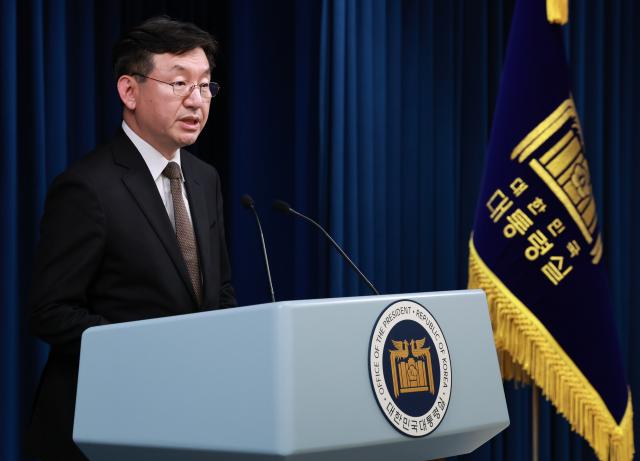
Sung Tae-yoon, director of national policy at the presidential office, said Japan should not take unfair measures on Naver while promising full support for the company in the escalating dispute.
Following a massive data breach from Line late last year, Japanese regulators issued administrative guidance, telling LY Corp (LYC), which runs the messenger app, to review its capital relationship with Naver.
LYC is owned by A Holdings, a 50:50 joint venture between Naver and Softbank.
"Given the Japanese government has repeatedly stated that the administrative guidance does not mention a stake sale and is not about management control, the Japanese government should not take any adverse measures against the will of Naver regarding the capital structure if appropriate measures to strengthen information security are submitted," the top policy official told reporters.
He said the government would provide technological and administrative advice on information security efforts to Naver if necessary.
"The government will continue to respond closely and strongly to ensure that Korean companies are not subjected to any discriminatory measures or unfair treatment against their will overseas," Sung added.
The remarks came just one day after he made a similar commitment, underscoring Seoul's stern position on the issue.
During a briefing Monday, he also called on politicians to avoid remarks that could trigger anti-Japanese sentiment, as it harms national interests and is detrimental to domestic firms.
Line has over 200 million users worldwide across various regions, with over 96 million users in Japan alone. LYC's Korean subsidiary, Line Plus, established in 2013, offers Line services worldwide except in Japan, operating in countries such as the United States, China, and Southeast Asia.
The tension stems from an incident in November 2023, when around 519,000 cases of personal information leak from Line occured after a server belonging to Naver Cloud was infected with malware. Naver Cloud shared an in-house system to manage users’ personal information with LYC.
Following the incident, Japan's Ministry of Internal Affairs and Communications demanded that LYC review its capital relationship with Naver and enhance safeguards for personal data.
The Japanese firm is mandated to provide regular reports on the progress of its operational enhancements.

Naver and SoftBank have recently been in talks over the possibility of Naver’s divestment. Junichi Miyakawa, the CEO of SoftBank, hinted at intentions to sell LYC during a briefing on May 9, saying, "We are in discussions with Naver regarding changes in LYC's capital structure. We aim to reach a consensus by early July."
On May 8, LYC ousted the company's chief product officer Shin Jung-ho, leaving the board consisting only of Japanese nationals. The company also said it would gradually terminate its outsourcing relationship and technological cooperation with Naver.
Naver issued an official statement on May 10, offering apologies for the data leak and outlining its future business direction.
"We will use this incident as a catalyst for further global advancement in the future. We also apologize to users of LYC for the security breach and will work with LYC and SoftBank to provide a more secure service," the company said in a press release. However, the portal service has not disclosed specific plans regarding stake sales, stating, "Until reaching a conclusion, we can't disclose detailed information."
The Korean government stepped into the dispute on May 10 when Second Vice Science Minister Kang Do-hyun expressed regret about the "purported pressure" from the Japanese government. The foreign ministry later said it respects the position of Naver and will offer the necessary support.
The dispute sparked anti-Japanese sentiment among the public and political circles in Korea. On Monday, liberal politician Cho Kuk visited the easternmost islet of Dokdo and criticized the government for not taking a strong stance on the Line incident. Japan has claimed Dokdo as its territory for decades.
On Tuesday, a group of civic groups staged a protest in front of the Japanese Embassy in Seoul condemning what they called "Japan's attempt to extort a Korean company." They also slammed the Yoon Suk Yeol administration for kowtowing to Japan.
Since his inauguration in 2022, Yoon has strived to improve ties with Japan, soured by historical issues stemming from Japan's colonial rule of the Korean Peninsula.
Naver's exit from the management of Line Plus and LYC could significantly impact its business not just in Japan but also in the entire overseas market. Naver is contemplating the option of divesting its stake and is exploring alternatives.
On Monday, Naver's labor union expressed opposition to Naver's stake sale, urging that the best choice for the protection of their members is not to proceed with the divestment.
Despite the challenges posed by the controversy, Naver remains committed to expanding its overseas market presence.
"We have been working on many strategies to expand beyond the domestic market and will continue to persist in these efforts," Naver's spokesperson Nam Ji-woong told Aju Press.
He added that the data leakage incident will not affect this endeavor. Nam highlighted Naver's global platforms, emphasizing its digital cartoon service, Webtoon, and the acquisition of Porchmark, a leading North American e-commerce marketplace completed in 2023.
Currently, Naver Webtoon offers services in over 10 languages. As of April 2023, Naver Webtoon had 85.6 million monthly subscribers across the world, with 52 percent of its content generating sales outside of Korea.
Copyright ⓒ Aju Press All rights reserved.




